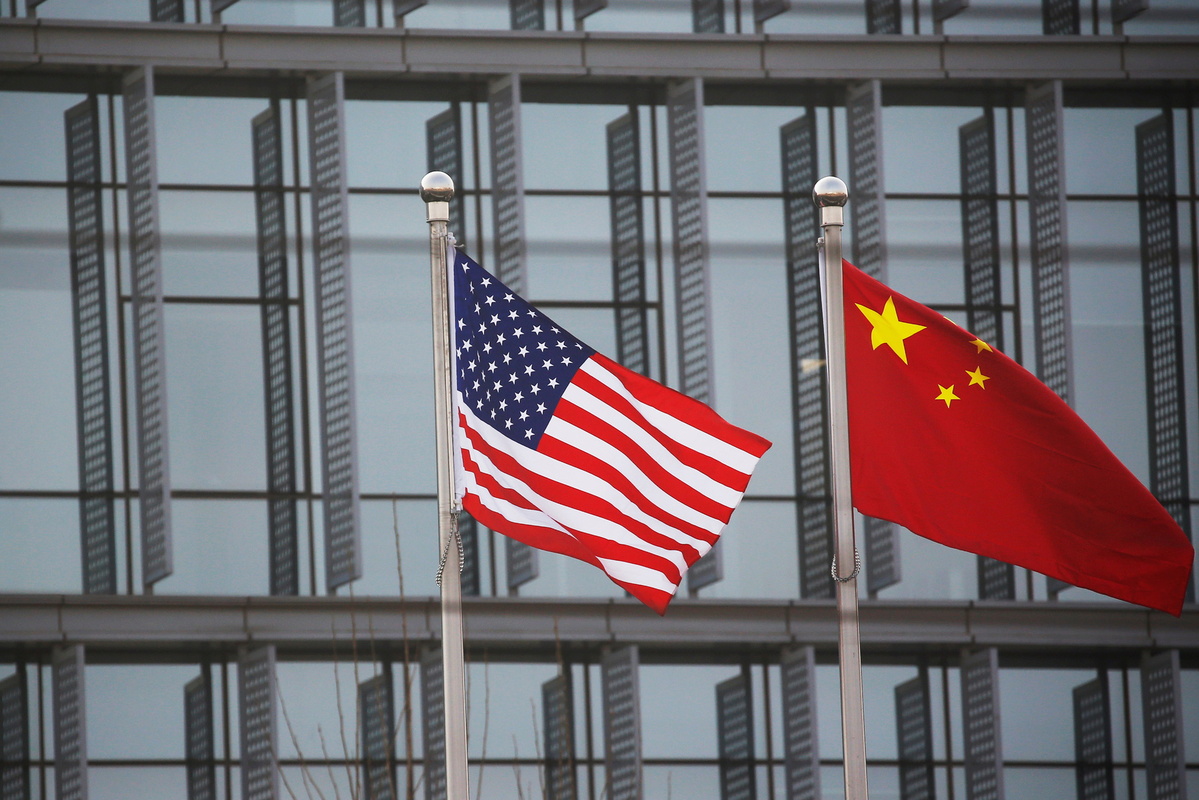
Chinese and US flags flutter outside the building of an American company in Beijing. [Photo/Agencies]
By Yuan Zheng
Sino-US relations have deteriorated to such an extent in recent years that the prospect of any improvement in the short term appears dim. The Joe Biden administration has been strengthening the United States' alliances and promoting so-called value-oriented diplomacy, leading some to believe Washington and Beijing are moving toward a head-on collision.
Unquestionably, a direct conflict between China and the US will have catastrophic consequences for the world, given that both are nuclear powers and leaders in artificial intelligence. And the increasing use of AI in military technology could make warfare even more brutal and destructive.
A Sino-US conflict would be not only devastating for the two countries but also for the rest of the world, leaving the regional and global economies in tatters.
China's rise is perhaps the most significant development in the past half a century, and it is, among other things, changing the global power structure. It is crucial to understand and appropriately respond to the rise of a major power, in order to maintain world peace and development.
Yet the "might makes right" mentality has been dominant in the West for the past 500 years, and the US probably views China's rise with the same mindset. To maintain its global hegemony, the US is resorting to all possible means, from forming new and strengthening existing alliances to forcing others to take sides in its disputes with countries it considers rivals. The fact is, the US cannot accept the reality of China's rise, as it fears that a stronger China will challenge its global hegemony. No wonder it has abandoned its policy of engaging with China and is doing everything in its power to check China's rise.
The current US policy toward China is fraught with contradictions. While it says it does not want to trigger a Cold War or conflict with China and, instead, seeks to build a "shield" of competition between the two sides, its actions suggest otherwise. The US is using every possible means to check China's rise including hurting China's core interests and interfering in China's internal affairs while seeking cooperation with China on certain issues. Also, the US is imposing sanctions on Chinese entities and, at the same time, asking China to further open up its market to American companies.
The Sino-US relations have reached a critical juncture. Cooperation between the two sides can become a cornerstone of global stability and help maintain global peace. With economic globalization deepening and all countries urging them to work together for the benefit of all, China and the US should forge a new path, a path that is devoid of confrontation, a path of mutually beneficial relationship.
As the world's two largest economies and permanent UN Security Council members, the US and China should build a healthy, stable relationship, so as to benefit people in both countries and meet the expectations of the international community.
The two major powers have to find the right path to peaceful coexistence in the new era, by respecting each other's social systems and development paths, respecting each other's core interests and right to development, treating each other as equals, managing their differences, and seeking common ground while shelving differences.
Not engaging in conflict or confrontation should be the bottom line for both sides. The US has said the two sides can "coexist", which is good. Better still, the two sides' aim should be "peaceful coexistence".
Also, since the interests of China and the US are intertwined, cooperation will benefit the two sides while confrontation will harm both. Since the world is big enough for both the US and China to thrive, the two sides would do better to adhere to the policy of mutual benefit, and not play zero-sum games.
Competition between China and the US is inevitable, but it should not be malicious. Neither side should challenge the core interests of the other; rather, they should engage in fair competition, such as a competition to determine which side contributes more to the world.
To avoid conflict and create the right global environment for peaceful coexistence, efforts should be made on four fronts. First, the two countries need to strengthen communication at all levels and in all fields to enhance mutual trust and prevent strategic misjudgments. They should also make good use of existing channels and mechanisms to hold dialogue, promote cooperation and solve urgent problems, while facilitating social exchanges.
Second, they should manage their differences in a constructive way to prevent relations from derailing.
Third, there is also a need for the US and China to deepen cooperation on issues of common interest. The two countries have common interests in fields such as the economy, energy, military, law enforcement, education, the internet and environmental protection. Hence, they should strengthen cooperation in these fields on the basis of equality and mutual benefit.
The nature of Sino-US economic relations is mutually beneficial, so Washington should not politicize bilateral economic issues and stop using the pretext of national security to weaken Chinese companies.
And fourth, the two sides should strengthen coordination and cooperation on major international and regional issues, including providing more public goods for the world, helping maintain a fair and reasonable world order, jointly promoting peace and global development, while joining hands to fight climate change, boosting the global economy, safeguarding public health, bolstering the non-proliferation and arms control regimes, cracking down on drug trafficking and transnational crime, and ensuring global food security.
In short, guiding Sino-US relations toward positive development is necessary for the benefit of both sides as well as the rest of the world. As two major global powers, China and the US have the obligation to lead the world toward a path that is conducive to peace and development.
The author is deputy director of the Institute of American Studies, Chinese Academy of Social Sciences.









